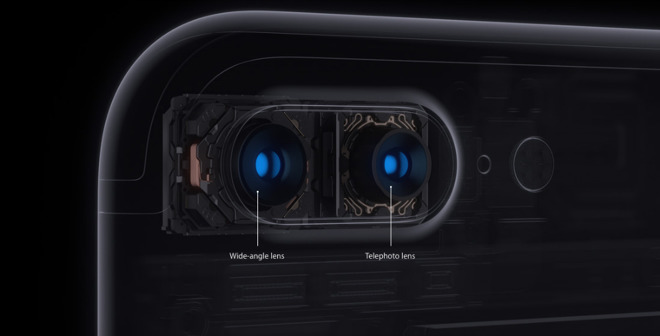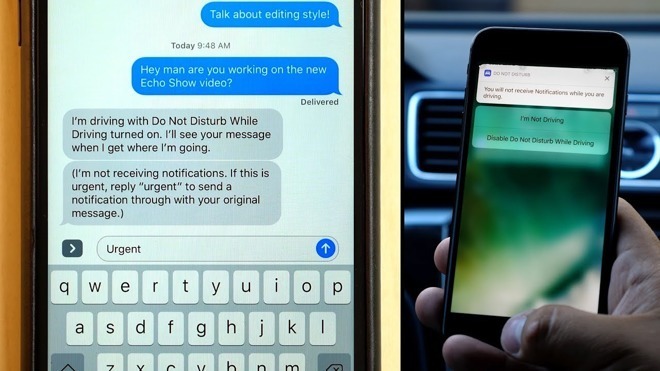A pair of lawsuits filed in two federal courts on Monday allege Apple's latest products are in infringement of multiple patents related to dual camera arrays in smartphones and smart device alerts.
The first case, lodged with the Northern California District Court, is being leveled by Israel-based camera specialist Corephotonics, which alleges Apple used key patented technology to create the dual camera array in iPhone X.
Corephotonics was founded in 2012 to develop next-generation smartphone camera technology under the guidance of Dr. David Mendlovic, a Professor at Tel Aviv University and former Chief Scientist of the Israeli Ministry of Science, according to the filing.
The firm's IP focuses on dual-aperture, fixed focal length camera technology to enable expanded zoom functionality with true telephoto capabilities. In addition, Corephotonics backed up its hardware designs with computational algorithms that ensure seamless switching between the two camera modules.
Apple touted a nearly identical set of features when it launched its first dual camera iPhone system with iPhone 7 Plus in 2016.
Corephotonics in a separate suit filed late last year took issue with the 7 Plus, though the current case offers additional information pertaining to Apple's interactions with the firm leading up to the handset's release.
Dating back to 2012, Apple executives and engineers met with Corephotonics staff and reviewed the company's intellectual property, specifically hardware and software solutions for multi-lens camera systems. Over the ensuing months, Apple sent various camera hardware and software teams to Corephotonics' headquarters in Tel Aviv to examine prototype components and learn about the firm's optical processing methods, as well as discuss potential partnership opportunities.
In June 2014, Apple expressed interest in licensing Corephotonics' dual camera algorithms and set up a meeting to discuss a business deal, according to the filing. Following the meeting, Apple requested access to a prototype telephoto lens, suggesting the companies could collaborate on hardware design.
Business negotiations were halted in August 2014, though technical discussions continued between Apple and Corephotonics engineering teams for a few weeks. The communication lull continued until 2016, when Mendlovic reached out to a "high level hardware executive" offering to discuss collaboration on future smartphone projects.
Following yet another meeting, Apple again expressed interest in formalizing a business agreement and requested information regarding IP licensing. That was in August 2016, one month prior to the debut of iPhone 7 Plus. By October, negotiations had again cooled and two subsequent meetings relating to potential licensing agreements bore no fruit.
After examining iPhone 7 Plus, Corephotonics deemed the handset to be in infringement of its patents. The company found much the same for iPhone X, Apple's most recent application of cutting-edge smartphone camera technology. Further evaluation of Apple's dual camera patents shows reference to Corephotonics IP and in some cases exact specifications noted in the current case's patents-in-suit.
Corephotonics names iPhone 7 Plus, iPhone 8 Plus and iPhone X as accused products, seeking damages, a permanent injunction against further sales and court fees.
Do Not Disturb While Driving
In a separate case brought before the patent holder-friendly Eastern Texas District Court, Alert Signal Intellectual Property alleges Apple is in infringement of four patents related to the conditional receipt of alerts, text messages and other communications on smart devices. More specifically, the patents-in-suit describe methods of disabling alerts based on handset velocity.
As detailed in the filing, the IP covers techniques of using a velocity sensor to determine the speed of a target device. If the detected speed is akin to that of a moving car, for example, the system automatically silences incoming alerts. Further embodiments refine the system to allow high priority messages, like those appended with the text "urgent," to pass through. The system is automatically disabled when measured velocities return to normal speeds.
The suit takes direct aim at Apple's Do Not Disturb While Driving technology, introduced with iOS 11 last year. When the feature is active, iPhone monitors its situational state to detect when a user is in their car, whether it be a connection to a vehicle's USB port or Bluetooth, or motion.
If the device is determined to be in a moving vehicle, it mutes incoming messages and sends an automated reply letting the sender know the recipient is on the road. Senders can mark the message as "urgent," which bypasses Do Not Disturb While Driving safeguards. Phone calls are handled in a similar manner, with all calls blocked except those from contacts in a user's Favorites list or from people who attempt to make two consecutive calls in a short time span.
The patents-in-suit, all of which are currently titled "Alert Signal Control Using Receiver Velocity," were granted between 2012 to 2016 to inventor Gary Shuster, then reassigned to IP licensing firm Cerinet. Cerinet subsequently assigned the patent group to an entity called Alert Signal Intellectual Property. The holdings firm sued AT&T in late 2015 using three of the four patents asserted in its case against Apple, only to withdraw the complaint two months later.
ASIP seeks damages, interest and court fees in its suit against Apple.
 Mikey Campbell
Mikey Campbell








-m.jpg)






 Marko Zivkovic
Marko Zivkovic
 Mike Wuerthele
Mike Wuerthele
 Christine McKee
Christine McKee
 Amber Neely
Amber Neely
 Sponsored Content
Sponsored Content
 Wesley Hilliard
Wesley Hilliard

 William Gallagher
William Gallagher









18 Comments
Do Not Disturb doesn’t work on notification messages which keep on blocking navigation. Will it be fixed in iOS12?
Good fracking god, can't believe this crap!
Doesn’t Apple already hold a patent for Do Not Disturb? I remember it being issued some time ago. Therefore this lot are going to have to have Apple’s patent invalidated first. Good luck with that.
So on one hand Apple gets sued (a little while ago) for not implementing s do not disturb while driving feature and now they get sued for implementing it?
At least the camera suit seems legit.
Bad Apple stealing camera technology, at least they can pay for it from the proceeds of their Samsung suit. Regarding the other one, obviously pure bullshit. BTW a 'velocity sensor' on a phone is a violation of Einstein's special relativity. Accelerometer, yes, 'velocity sensor', no.